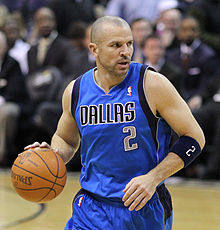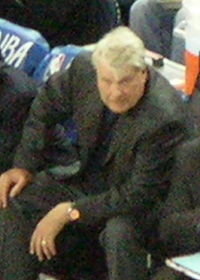He had taken over in Dallas with 18 games left in the 2004-05 season and guided the Mavericks to a 16-2 record. In three full seasons, he had won 60, 67 and 51 games. Why would any owner want to fire someone like that?
“I just got a sense, as I told Avery this morning, that he just wasn’t reaching them anymore.”
That statement certainly applied in Dallas in 2008, but it was made by Nets GM Billy King on Thursday. The translation: Avery hadn’t changed a bit.
I covered Johnson in Dallas and read with interest the analysis of his Nets departure, which was basically that the disconnect between players and coach was obvious to anyone who walked in the locker room.
 That’s the way Jason Kidd found it in Dallas when he was traded from the Nets to the Mavericks in February 2008. After Johnson was fired when the Mavericks were eliminated from the playoffs in the first round, Kidd went back to the East Coast for the summer.
That’s the way Jason Kidd found it in Dallas when he was traded from the Nets to the Mavericks in February 2008. After Johnson was fired when the Mavericks were eliminated from the playoffs in the first round, Kidd went back to the East Coast for the summer.
Kidd was sensitive to his reputation as a “coach killer” but told a friend, “They can’t blame that one on me. When I got there, the players all thought he was crazy.”
And then pausing for effect, Kidd said: “And he was.”
Avery Johnson did not like the way the 35-year-old Kidd played, and told several people when he left the Mavericks, “Jason Kidd is finished.”
Three years later, Kidd and the Mavericks won the team’s first championship. At age 40, Kidd is still playing – and Johnson is not coaching.
It did not seem to make sense that Johnson, a point guard, would not like one of the two or three best point guards in NBA history. But he did not.
Why?
Simple. Johnson thought the game should be played one way; Kidd played it another.
So did the Nets. They obviously didn’t like Johnson’s system, but that was not something Johnson could understand. That system was the product of a 5-10 overachieving point guard who defied the odds and lasted 16 years. How could they not like something developed by a man like that? It made no sense to Avery.
Johnson’s career as a head coach has been the polar opposite of his playing career, which he began as an undersized free agent.
He began coaching with a gift-wrapped elite team that had won 50 or more games in four consecutive seasons and would ultimately stretch that streak to 11 consecutive seasons.
 Former Mavericks coach Don Nelson was enamored with Johnson’s aptitude for the game. He mentored Johnson and then when Nelson felt the Mavericks weren’t responding to his coaching, he stepped aside for Johnson.
Former Mavericks coach Don Nelson was enamored with Johnson’s aptitude for the game. He mentored Johnson and then when Nelson felt the Mavericks weren’t responding to his coaching, he stepped aside for Johnson.
The Mavericks were a highly skilled team but Johnson could not control those traits that were wonderful as a player but destructive as a coach.
He rode the team relentlessly, he was loudly critical when he saw a lack of fundamentals, he stubborn, pugnacious, demanding and he could not channel his passion in a positive way.
Ultimately, he wore the players out. When he left, Dirk Nowitzki – probably one of the easiest-going superstars in NBA history – called Johnson “a dictator.”
Johnson has a 440-254 coaching record, so it would seem that he will get another chance to be a head coach. But you have to wonder. Johnson has burned out with a great team and seems to have done the same thing with a not-so-great team.
Avery Johnson the head coach has far more talent than Avery Johnson the player.
But Johnson the player figured out a way to be a survivor. Thus far, Johnson the coach has not.
Jan Hubbard has written about basketball since 1976 and worked in the NBA league office for eight years between media stints. Follow him on Twitter at @whyhub. For Hubbard’s archive from SheridanHoops.com, click here.
Great article, Jan.